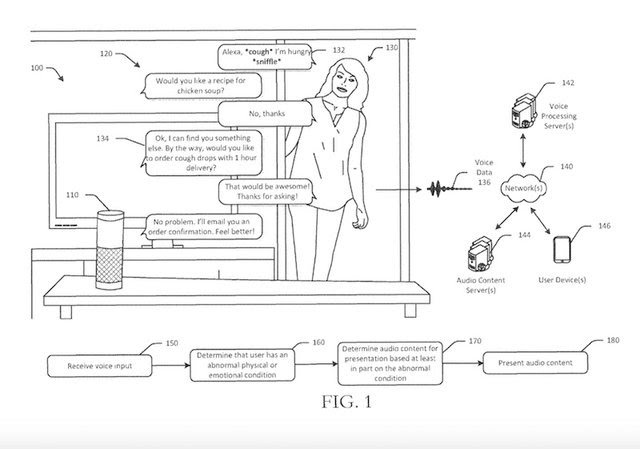Amazon recently was granted a new patent for an advance in the capability of it's voice assistant, 'Alexa', that enables the Alexa to detect a user's emotional, physical and behavioral states, just from the the user's voice and other audio signals. The technology would allow Alexa to recognize audible cues, such as a sneeze, or a cough or a certain cues from the user's tone of voice, and interpret those cues, along with the words the user has spoken, to better understand how a user is feeling, mentally and/or physically, and provide tailored responses based on that information.
Have a look at the image below, courtesy of this piece on Business Insider for a graphic of how this kind of an interaction, and how Alexa will attempt to use these audio cues to respond.

The image may be a bit hard to see, so I can try and spell it out for you. The user indicates that she is hungry, but while trying to say the sentence "I'm hungry", she both coughs and sniffles. Alexa responds by asking 'Would you like a recipe for chicken soup?', a very specific response to the statement 'I'm hungry.' In this case Alexa has 'heard' the user's cough and sniffle, and the statement indicating hunger, and replied with an offer of a recipe for chicken soup - a type of food long associated as one that people who are sick would appreciate. Alexa doesn't 'know' the user is sick, the user has not stated that in words, but the cough and sniffle, behaviors that can often indicate an illness of some kind, are included in Alexa's consideration of the best reply to the user's 'I'm hungry' statement.
As the interaction between Alexa and the user continues, Alexa asks the user if she would like Alexa to order her come cough drops, to which the user replies 'yes' - still having never explicitly indicated to Alexa that she is sick or experiencing and symptoms of illness. Alexa submits the order for the user and will let her know when it is completed.
This is a simple example of how Alexa, or any voice assistant technologies really, are likely to evolve over time, to move from simply being 'order followers' to something much more sophisticated and potentially more powerful. Instead of just following commands kind of like a well-trained puppy, Alexa would be able to suggest actions, directions, products, etc. that perhaps the users had not thought about yet themselves, but would find relevant, timely, effective, and engaging.
The initial reporting on this patent from Amazon focuses, (naturally), on Amazon's business strenghts - surfacing and presenting product recommendations to users that match what the users want and need at the right time, and then helping the users order said products and delivering them to the user as quickly as possible. But I'd like to think about how this kind of innovative application of voice technology may apply one day at work and in workplace settings. Here are just some possibilities:
1. An employee accesses their voice-assistant HR system to request some HR information. The voice assistant 'hears' coughs and sniffles like in the above example and suggests that the employee may need some rest, or even to book an appointment with the company's mobile app that provides 'on-demand' medical consultation service.
2. An employee completes a project and the voice assistant asks her to give some feedback on how she thought the project went. The VA senses some stress in the user's voice, and her project summary indicates some real issues with some members on the team. The VA can send information to the project team providing some recommended further actions and remedies for the situation, as well as tips for the project leader to deal with this employee's frustration.
3. If in the interaction with the HR voice assistant, the VA senses some general anxiety or stress, it could present the user with a prompt to enable the workplace wellness voice application or skill, or suggest some common stress remediation approaches or exercises. The user may not have ever searched for or even be aware of these services, but the VA can sense they may need them in the moment.
These are just some ways that more intelligent and sophisticated applications are evolving in the voice assistant marketplace. And just like almost every consumer tech advance of the last 30 years, pretty soon these capabilities will be available in workplaces - and employees will demand them.
I think voice is the most interesting tech sandbox right now - I am really interested in how it will play out.
Have a great day!